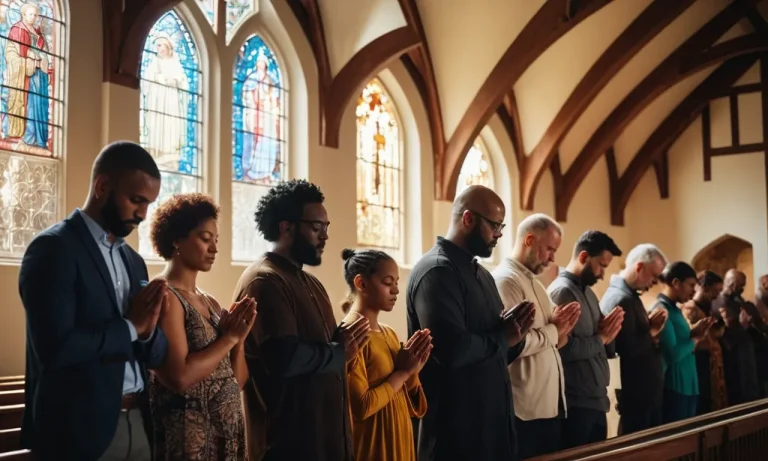What Does Oppression Mean In The Bible?
Oppression is a heavy topic that weighs on the hearts of many. If you’re feeling crushed under the weight of injustice, you’re not alone. The Bible has a lot to say about oppression from cover to cover.
If you’re short on time, here’s a quick answer to your question: In the Bible, oppression refers to prolonged cruel or unjust treatment, often by people in power. It involves exploiting, subjugating, and inflicting misery on vulnerable groups.
In this comprehensive article, we’ll dive deep into the meaning of oppression according to the Bible. We’ll look at various Hebrew and Greek words translated as oppression, examine biblical examples, and see what God’s Word says about how to respond.
Defining Oppression in the Bible
The Hebrew Word Lahaṣ
The Hebrew word lahaṣ (לָחַץ) is most often translated as “oppress” or “oppression” in the Old Testament. It means to press upon, squeeze, or crush. Oppression often involved forcing people into slavery or servant hood and treating them ruthlessly (Exodus 3:9; Deuteronomy 28:29).
The prophets frequently condemned the powerful who exploited the vulnerable for their own gain (Isaiah 5:7; Jeremiah 5:28).
Here are some examples of oppression called out in the Old Testament:
- Forcing people into slavery or servant hood against their will (Leviticus 25:39)
- Taking advantage of the poor (Proverbs 14:31)
- Judges showing partiality to the wicked and denying justice to the needy (Psalms 82:2)
- The rich exploiting the poor (Amos 4:1)
- Not paying proper wages to laborers (Jeremiah 22:13)
God holds His people to a high standard when it comes to caring for the disadvantaged. He calls on them to “not oppress a stranger” and reminds them they were once oppressed in Egypt (Exodus 23:9). Love for neighbor necessitates fighting against oppression and injustice.
The Greek Word Katadunasteuō
In the New Testament, the Greek word katadunasteuō (καταδυναστεύω) is translated as “oppress.” It means to exercise power or dominion against someone. Jesus used this word when quoting from Isaiah 61:1, saying He had come “to set at liberty those who are oppressed” (Luke 4:18).
The New Testament speaks out against injustice and mistreatment of others:
- Jesus brings good news to the poor and proclaims release to the captives (Luke 4:18)
- Pure religion cares for widows and orphans in their distress (James 1:27)
- Masters must treat servants justly and fairly (Colossians 4:1)
- The rich are warned against exploitation and fraud (James 5:1-6)
Followers of Christ are exhorted to imitate God’s care for the downtrodden. Just as God hears their cries, His people must open their eyes to see injustice around them and have the courage to stand up for the oppressed.
Examples of Oppression in Scripture
The Oppression of the Israelites in Egypt
The book of Exodus details how the Israelites were oppressed as slaves in Egypt for over 400 years (Exodus 1:8-14). The Egyptians subjected them to forced labor and attempted to curb their population growth.
However, the more the Egyptians oppressed them, the more the Israelites grew in number (Exodus 1:12). God heard their cries and sent Moses to deliver them from bondage (Exodus 3:7-10). After 10 plagues, Pharaoh finally let them go.
This story illustrates how God cares for the oppressed and will deliver them.
Oppression of the Poor and Needy
The Bible speaks frequently about caring for the poor and needy. God commands his people not to oppress them but to help meet their needs. For example, Deuteronomy 15:7 says, “If there is a poor man with you, one of your brothers, in any of your towns in your land which the Lord your God is giving you, you shall not harden your heart, nor close your hand from your poor brother.”
The prophets often condemned the oppression of the poor (Isaiah 3:14-15, Ezekiel 22:29). Jesus showed special compassion for the poor and marginalized. Christians are called to follow his example.
The Oppression of Jesus
Although he was sinless, Jesus suffered oppression and injustice during his life on earth. The religious leaders opposed his teaching and conspired against him (Mark 3:6, John 11:47-53). Judas betrayed him (Luke 22:3-6), Peter denied him (Luke 22:54-62), and the crowd turned against him (Luke 23:13-25).
He endured an illegal trial and false accusations (Matthew 26:59-68). The Roman soldiers mocked, beat, and crucified him (Matthew 27:27-44). Despite this injustice, Jesus submitted himself for our salvation (Philippians 2:8).
His suffering reminds us that oppression has always existed, yet God can redeem it.
What the Bible Says About Oppressors
God Sees and Hears the Oppressed
The Bible makes it clear that God cares deeply for those who are oppressed and takes note of their suffering. Exodus 3:7 says, “The Lord said, ‘I have indeed seen the misery of my people in Egypt. I have heard them crying out because of their slave drivers, and I am concerned about their suffering.'”
This shows that oppressors should beware, as God is aware of the injustice they dispense and hears the cries of the oppressed. The book of Psalms echoes this idea in multiple places. Psalm 9:9 declares, “The Lord is a refuge for the oppressed, a stronghold in times of trouble.”
Psalm 10:17-18 continues, “You, Lord, hear the desire of the afflicted; you encourage them, and you listen to their cry, defending the fatherless and the oppressed.” God promises to bring justice for those who are persecuted.
Oppressors Will Face Judgement
While oppressors may seem to get away with cruelty or unfair treatment for a time, the Bible warns that they will ultimately face judgement for their actions. Ecclesiastes 5:8 cautions, “If you see the poor oppressed in a district, and justice and rights denied, do not be surprised at such things; for one official is eyed by a higher one, and over them both are others higher still.”
Human justice systems may fail, but God’s perfect justice will prevail in the end. The book of James speaks sternly to those who exploit others, saying, “Look! The wages you failed to pay the workers who mowed your fields are crying out against you.
The cries of the harvesters have reached the ears of the Lord Almighty” (James 5:4). Oppressors, therefore, would do well to heed God’s standards of justice.
Warnings Against Becoming an Oppressor
Rather than simply condemning oppressors, the Bible also warns people not to become oppressors themselves. Commands such as “do not take advantage of the widow or the fatherless” (Exodus 22:22) make it clear that God’s people must not become perpetrators of injustice.
And Leviticus 25:17 states, “Do not take advantage of each other, but fear your God. I am the Lord your God.” Jesus modeled care and concern for the powerless and marginalized. And the apostle Paul instructed the Ephesians, “Be kind and compassionate to one another, forgiving each other, just as in Christ God forgave you” (Ephesians 4:32).
Treating others with dignity, respect, and compassion aligns with godly living. But exploiting or subjugating people for selfish gain goes directly against biblical principles.
Overcoming Oppression Through Faith
God Delivers the Oppressed
The Bible clearly states that God cares deeply for the oppressed and promises to deliver them from their afflictions (Psalm 9:9, Psalm 10:17-18). Throughout Scripture, we see examples of how God rescued his people from oppression, such as freeing the Israelites from slavery in Egypt (Exodus 3:7-10).
God is described as a strong tower and refuge for the oppressed to find safety and protection (Psalm 9:9, Psalm 46:1).
As Christians facing oppression, we can call upon God in prayer, asking for his intervention and deliverance. We should bring our hurts and burdens to him, trusting that he hears us and will act in his perfect timing (1 Peter 5:7).
Though we may continue to face trials for a season, we can have hope and confidence that God will bring justice and make right all wrongs in eternity (Revelation 21:4).
Trusting God for Justice and Vindication
The Bible exhorts us not to retaliate against those who oppress us but instead to trust God to fight on our behalf (Romans 12:17-21, Deuteronomy 32:35). As much as we desire to see justice served in various situations of oppression, God calls us to refrain from taking vengeance into our own hands.
Rather than trying to vindicate ourselves, believers are instructed to wait patiently on the Lord, who promises to bring hidden things to light and repay people according to their deeds (Psalm 37:5-6; Romans 12:19).
Though evil may appear to triumph for a season, we can take confidence in God’s ultimate justice and know he will make all wrongs right (Revelation 22:12).
Loving Enemies and Forgiveness
Incredibly, God’s Word calls us not only to refrain from retaliation against oppressors but to love and pray for them, even if they are enemies who persecute us (Luke 6:27-28). As Christ himself prayed from the cross, “Father, forgive them, for they know not what they do” (Luke 23:34).
We are to mirror God’s incredible grace, who sent his Son to die even while we were still sinners (Romans 5:8).
Undoubtedly, this teaching seems impossible by human standards. Yet we are enabled to walk in supernatural forgiveness and mercy by the power of the Holy Spirit within us. When we forgive others as God has forgiven us, we release bitterness and experience freedom and healing (Matthew 6:14-15).
God also promises to use such selfless, radical love to soften the hearts of oppressors and turn enemies into friends (Proverbs 16:7).
Conclusion
Oppression grieves God’s heart. He promises to be a stronghold for the oppressed and bring justice in His timing. While awaiting relief, He provides strength to endure unjust treatment through faith and the hope of eternity. We can walk in freedom in Christ, even when facing oppression.
Rather than becoming bitter, we can overcome oppression by trusting God, praying for our enemies, and letting Jesus’ love shine through us. This points others to the true Liberator – the One who sets all the captives free.








